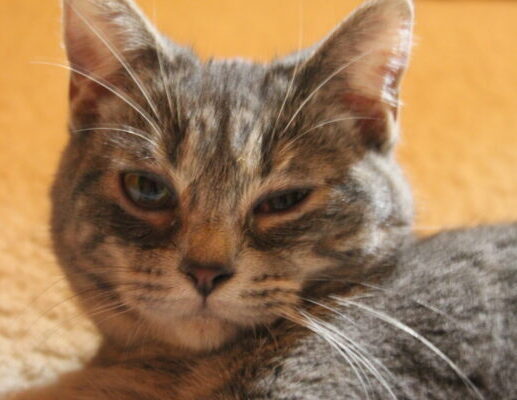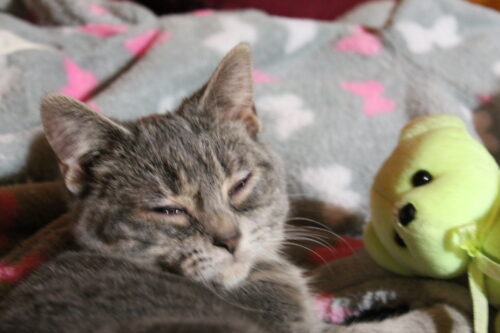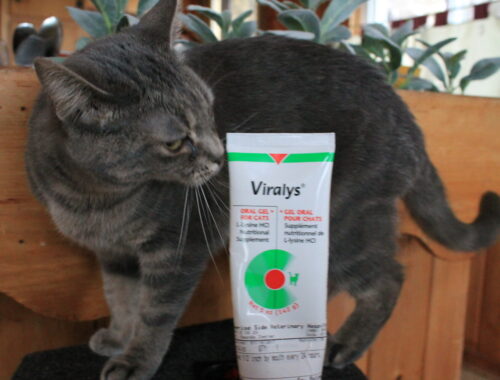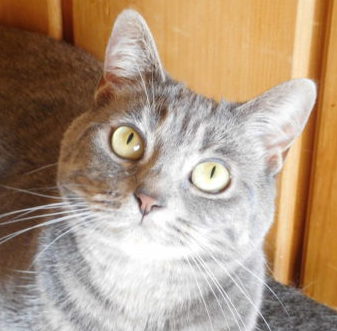Bringing home a rescued cat is a heartwarming experience, but sometimes, these animals come with underlying health issues. When I adopted my cat, Sophie, from the shelter, she had one eye half-closed and a watery discharge from both eyes. I took her to the vet, who prescribed an eye ointment to apply twice a day, but it didn’t work. Her eyes continued to discharge for weeks, and one eye remained half-closed. Determined to understand the cause before further steps, I began researching cat eye discharge on my own.

What I Found Out About Cat Eye Discharging
When I first took Sophie to the vet, they couldn’t pinpoint why her eyes weren’t improving with the ointment, so I decided to do some research of my own to understand what might be going on before getting a second opinion. I quickly learned that watery eyes in cats can be caused by several factors, and it’s more of a symptom than a disease in itself. Some common causes of eye discharge in cats include upper respiratory infections, conjunctivitis, diarrhea, blepharitis (inflammation of the eyelid), corneal disease, epiphora, dry eye, allergies, and more.
With so many potential causes, I realized I needed to understand the different types of discharge in cats to figure out what was happening with Sophie’s eyes. Here’s what I discovered:
Identifying the Type of Cat Eye Discharge
When it comes to eye discharge, the type of discharge can give you clues about what’s going on. Watery discharge is often linked to viral infections, allergies, or irritants. Mucopurulent discharge, which is thick and yellowish, typically signals a bacterial infection. Mucoid discharge, which is thick and clear, is usually caused by dry eye or allergies. Since Sophie’s discharge was clear and watery, I suspected it could be a viral infection or allergies. That’s when I decided to take her to another vet for a second opinion.

The Diagnosis: Feline Herpesvirus (FHV-1)
After consulting a second veterinarian, we confirmed that Sophie had an upper respiratory infection due to a virus, most likely feline herpesvirus type 1 (FHV-1). This virus remains in a cat’s system for life, flaring up when the immune system weakens due to stress or other factors.
TheTreatment That Cured My Cat’s Watery Eyes
My veterinarian recommended a multi-step approach:
- Antibiotics – To treat any secondary bacterial infections caused by the viral infection.
- Lysine Supplementation – An essential amino acid that helps reduce FHV-1 flare-ups and supports the immune system.
- Nutritional Support – Feeding her nutritious, healthy cat food to strengthen her immune system.
- Allergen Reduction – Switching to a low-dust, unscented cat litter to minimize irritation.
- Stress Reduction – Keeping her environment calm, providing enrichment, and ensuring she feels safe. A very important aspect is maintaining your cat’s routine to reduce stress, including playtime.
Why Lysine is Essential for Cats with Watery Eyes
Lysine is a powerful supplement that helps manage feline herpesvirus symptoms. It works by inhibiting arginine, an amino acid that FHV-1 needs to replicate. Regular supplementation can:
- Reduce eye discharge and flare-ups.
- Strengthen the immune system.
- Decrease the severity and frequency of respiratory symptoms.
There are mixed opinions about how well lysine works for treating feline herpesvirus (FHV-1). Some studies aren’t convinced, but many vets still recommend it to manage symptoms like watery eyes. It’s thought to help by slowing the virus’s replication, and while it doesn’t work the same for every cat, it has helped a lot of them, including my cat Sophie. There’s even anecdotal evidence that it might speed up healing and reduce recurrences. That’s why lysine is still a go-to treatment for easing watery eyes in cats and supporting their immune system.

The Results: A Healthy, Happy Cat
So I made the necessary changes recommended by my vet and I started Sophie’s treatment with lysine. I added 1/2 inch of Lysine gel to her wet food daily for about six months. Over time, her symptoms improved significantly. While her eyes were still slightly watery at first, the discharge progressively decreased. After ten months, Sophie’s eyes were completely clear, and she was a healthy, happy cat.

Frequently Asked Questions: Cat Watery Eyes & Lysine
Can lysine be used as a long-term solution for watery eyes in cats?
Lysine is often recommended to manage symptoms of feline herpesvirus (FHV-1) over time, but it’s essential to consult with your vet about long-term use. While it may reduce flare-ups, it doesn’t cure the virus, and each cat’s response can vary. For my cat Sophie, lysine helped manage her symptoms and cure her watery eyes, but it’s important to monitor and adjust based on your vet’s advice.
How quickly can I expect to see results after starting lysine supplementation for my cat?
Results can vary. Some cats show improvement within a few days, while others may take a few weeks. For Sophie, it took over six months to see results, but once we got on track with consistent use, her watery eyes improved significantly.
Is it safe to use lysine for cats with other underlying health conditions?While lysine is generally safe for most cats, it’s always a good idea to consult your vet, especially if your cat has other health issues. My vet suggested lysine for Sophie even though she had other minor health concerns, and it worked without issue, but I’d still recommend discussing it with your vet first.
Is Lysine alone enough to cure my cat’s watery eyes?
If the cause of your cat’s watery eyes is a respiratory infection like the herpesvirus (as in my cat’s case), lysine alone isn’t enough to cure it. The treatment typically involves a combination of steps, including prescription antibiotics if there’s a bacterial infection, reducing allergens in the environment, switching to a healthy cat diet to support the immune system, and minimizing stressors as much as possible. Lysine can be a helpful part of this overall approach, but it’s most effective when used alongside other treatments prescribed by your vet.
What I Learned About Budgeting and Lysine Brands for My Cat’s Watery Eyes
To follow the treatment, I initially bought lysine from my vet’s office, thinking it was a specialized supplement only available there, but I realized I may have overpaid. It’s been years since, and I still give Sophie lysine occasionally to support her immune system. I’ve switched brands over time to stay within budget, but not all of them work the same, and Sophie doesn’t like them as much, so I always stick with Viralys Lysine. You can get it on Amazon 👉 here or on Chewy 👉 here.
Final Thoughts: Managing Feline Watery Eyes Long-Term
Watery eyes in cats can indicate chronic respiratory infections, like feline calicivirus (FCV) and herpesvirus, which never fully leave the body. Maintaining a strong immune system in cats is key. Lysine supplements help control the virus, while quality nutrition boosts immunity. Reducing stress and maintaining a consistent routine can prevent flare-ups, and minimizing allergens, such as using dust-free litter and keeping the environment clean, also helps.
This journey with Sophie taught me the importance of proactive care. If your cat is struggling with persistent watery eyes, consider lysine as part of a holistic approach. With a few simple changes, it made all the difference for Sophie—and it could help your cat too!
Sources:
–My experience visiting two vets with Sophie
–Purina: “Why Are My Cat’s Eyes Watering?
–WebMD: “Eye Discharge In Cats”
–VCA Animal Hospital: “Conjunctivitis in Cats”
–PetMD: “Lysine for Cats: What You Should Know”
Hi Lorena,
I chance upon your website when I was searching for the cause of my cats eye. They have similar symptoms. Hope to chat with you more.
My cat got cured from this. So far she has healthy eyes due to the treatment I put her on. Ask me any question and I am glad to help.
My cat has yellow pus coming from one eye I wipe it every morning but still comes back next day is it normal. ?
If your cat has yellow pus coming from one eye, take it to the Vet because it may be sign of bacterial infection. They may test the type of bacteria and treat it with the proper anti-bacterial ointment.
I’ve already been to the vet, but still having a problem. My Molly has that type eye discharge, and occasionally sneezes. But also has dirt-like skin issue around mouth and under chin. The vet called it feline blackheads. I feel these symptoms may be related to the food and or treats I’m giving her, and an immunity problem as well. I’m going to order the lysine but wanted to see what other things I might do for her to help. What brands and type/s of cat food & treats do you feed Sophie? Also, what brand and type litter are you using?
Hello Eileen. I use the Litter Robot and the litter is Fresh Step unscented. It has low dust when pouring it in the Robot. I feed Sophie Go Petcurean Chicken & Turkey and I mix it with Go Sensitivities Limited Ingredients. I suggest you to feed your cat with Go Sensitivities Limited Ingredients dry food. Wet food I feed my cat is Wellness Healthy Indulgence Gravies Chicken & Turkey. Also it’s very important to keep your cat on a daily routine with no major changes. Anything that changes your cat’s routine stresses your pet and it affects its immune system and this creates more watery eyes and sneezing. It happened with Sophie so I tried to keep her routines everyday. Feeding same time, food in same place, playing at the same time, etc etc. I hope your cat gets better, I am sure the Lysine will help a lot. It really helped my cat.
PD: if your Vet gave you some drops or ointment to put on its eyes sometimes this worsens the problem because it’s not always a bacterial issue. It happened with my cat the first time when we took her to the Vet, the drops and ointment worsened her eyes. It seems like drops sometimes don’t help, but the Lysine did help my cat. Anyway, this is my experience. Hope this helps!
Hello, thank you soo much to share your story. I have exactly the same story of your cat with discharged one eyes and all symptoms. I have 6 cats. They all got it but cured except one. That one is happening again now. He hardly can’t breath, diarrhea, sneezing and coughing. I’m giving him viralys every as well others too. I’m tired, it breaks my heart. The vets couldn’t find what he got. I was desperately need help and answers until I saw that. I really hope he will get better.
Hello Anna, from what I have experienced with my cat Sophie, every time she experiences stress for whatever reason, traveling to a different city, me or my husband leaving for a few weeks, etc., my cat experiences some sneezing and sometimes a slightly watery eye (not always though). As soon as she adapts to the new situation or me or my husband get back home her symptoms subside. The best bet is trying to keep his routine as stable as possible and lots of love and play. Of course, keep giving him lysine as well. The herpes virus symptoms (which is what my cat has) is totally related to how strong is the cat’s immune system and stress contributes to lower the cat’s immune response. A very stable routine including everyday play is the best way to avoid stress in cats. Also, this condition is affected by dust in the air (keep the air conditioning filter replaced), Vaccum the carpet as much as you can, choose a very low-dust cat litter. If nothing works you must take your cat to a different vet and get a full blood work panel. Hope that helps.